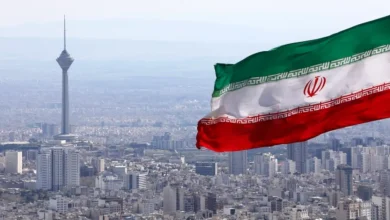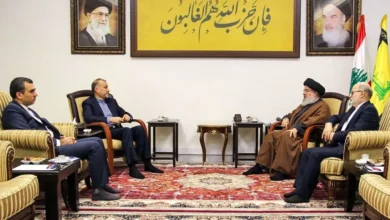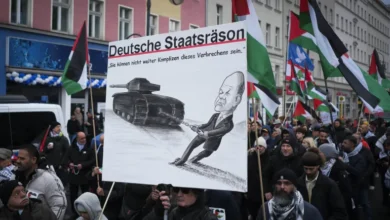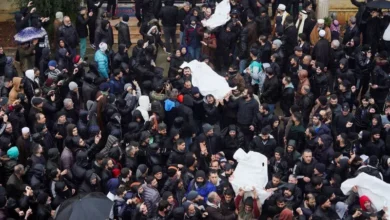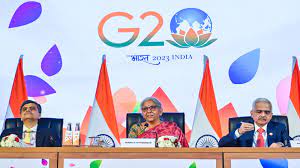Volodymyr Zelenskyy: A ‘dictator’, or a ‘Ukrainian Churchill’?
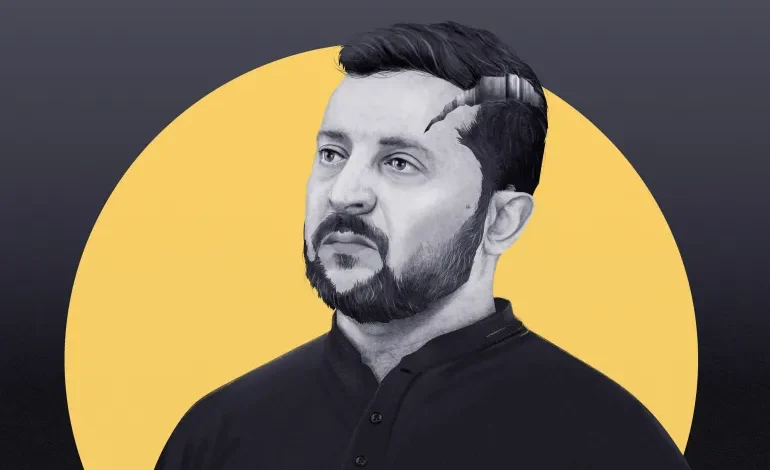
It’s next to impossible to imagine Volodymyr Zelenskyy clean-shaven, clad in casual clothes and cracking jokes right next to the Kremlin.
“I’m here, in the heart of Russia – if it still has a heart,” a radiant Zelenskyy quipped in a satirical “news dispatch” filmed near the Kremlin’s vermilion walls.
The year was 2014, Moscow had already annexed Crimea and was backing separatists in Donbas and pro-Kremlin protesters in Ukraine’s Russian-speaking east and south.
Zelenskyy was a comedian, actor and head of the District 95 troupe. Politics, for him, was fodder for sarcastic routines. “You can say, ‘hail Ukraine’ in Moscow, and nothing serious will happen to you,” he said in the video. “Nothing that can’t be handled by modern medicine.”
More than a decade later, he doesn’t crack jokes for a living any more. Instead, he is president of wartime Ukraine – and on Friday is scheduled to meet with his US counterpart Donald Trump in Washington. Three years after Russia began its full-scale invasion of Ukraine, Zelenskyy’s nation needs more than modern medicine to survive as Trump signals a willingness to sacrifice Kyiv’s interests for a deal with Putin, whom he has previously said he admires.
Last week, Zelenskyy stunned the world by offering to resign in exchange for security guarantees and NATO membership for Ukraine, amid growing personal tensions with Trump, who has ruled out Kyiv’s entry into the alliance.
But surprising people isn’t new for Zelenskyy.
His political brand since his foray into politics has been built on the idea that he’s no regular politician, hungry to stay in power at any cost. And Zelenskyy’s carefully curated, shape-shifting image has been central to that narrative.
‘Ukraine of my dreams’
Since the late 1990s, Zelenskyy the actor has tried a dizzying array of masks on stage, as well as blue and silver screens.
He performed in front of Russian President Vladimir Putin, impersonated Putin’s alleged mistress Alina Kabayeva, wore black latex and high heels while moaning about the taste of uncured lard, and played Napoleon, musketeer d’Artagnan and a wannabe heartthrob in slapstick comedies and TV series.
And, of course, there was a role of Vasily Holoborodko, a dirt-poor history teacher whose obscene rant about corrupt politicians and oligarchs made Zelenskyy a YouTube star with the series Public Servant, propelling him to presidential power.
That involved Zelenskyy’s first image makeover.
Ukrainians were disillusioned with Petro Poroshenko, an oligarch-turned-president, who reneged on his pledges to end the Donbas war and quell corruption when he came to power in 2014 – and instead got mired in corruption scandals of his own.
In 2018, Zelenskyy registered a political party predictably named Public Servant – and topped opinion polls months before officially stepping into the election fray. A psychologist explained his decision to become a politician as reflective of his “trickster” desire to break Ukraine’s political order.
“Zelenskyy is an archetypal trickster, a person who destroys, despises, doubts things, breaks the rules,” psychologist Valentyn Kim told the DSNews.ua website in June 2022. He “stormed into Ukrainian politics as a destroyer of previous political accords”.
And during the war, a trickster is “a more effective figure” than regular leaders, he was quoted as saying.
During his election campaign, Zelenskyy’s public relations team shrewdly streamlined his media coverage by shunning news conferences and interviews with foreign media outlets to avoid negative coverage, instead controlling the news flow through videos and social network posts.
He announced his candidacy on New Year’s Eve, a secular equivalent of Christmas in most of the former Soviet Union – and congratulated Ukrainians with a “new public servant” – himself.
He started wearing suits and turtlenecks. His pledges sounded youthfully optimistic.
“I’ll tell you about the Ukraine of my dreams. The Ukraine, where the only shooting is the sound of wedding fireworks, the Ukraine, where you can register a business within an hour, get a passport in 15 minutes and vote in one second, online,” he said in a booklet disseminated by his team in early 2019.
In the April 2019 presidential election, he trounced Poroshenko, winning a staggering 73 percent of the vote – the highest ever vote share in Ukrainian history.
He was the anti-establishment golden boy, the peacenik who celebrated his election in a nightclub and who would rewrite Ukraine’s political playbook.
As he took the presidential pledge, Zelenskyy came across as someone who was “anti-power, someone who’s destined to do things differently, not the way his predecessors did”, Svitlana Chunikhina, vice president of the Kyiv-based Association of Political Psychologists told Al Jazeera.
Rising amid anti-Semitism
In most of his roles as a comedian, Zelenskyy spoke Russian – and often added an exaggerated accent, a cliché typically associated with Ukrainian Jews. It was an artistic reference to the Black Sea port of Odesa, the capital of both Ukraine’s Jewish community and satire.
But Zelenskyy is himself Jewish – his great-grandfather and three of his sons were killed by German Nazis, and the only surviving child, Semyon, was a decorated World War II hero.
Today’s Ukraine lionizes Semyon’s sworn enemies – nationalist, anti-communist and anti-Semitic leaders Stepan Bandera and Roman Shukhevych – turning a blind eye to their collaboration with the Nazis and their role in the mass killings of Jews and Poles.
And given that czarist-era Ukraine was the epicentre of pogroms that forced millions of Ashkenazi (Western) Jews to the United States and Palestine, Zelenskyy’s rise to power seems even more improbable.
Surprisingly, his roots “were not part of the agenda” during the 2019 campaign, Kyiv-based analyst Vyacheslav Likhachyov told Al Jazeera.
Zelenskyy’s “turbo-patriotic opponents had enough triggers” such as District 95’s irreverent jokes about anti-Russian protesters who clashed with police loyal to pro-Kremlin President Viktor Yanukovych, and about a decree from the Constantinople Patriarch Bartholomew on establishing a new Ukrainian Orthodox Church independent from the Moscow Patriarchate.
However, there were widespread insinuations from Poroshenko loyalists and nationalist groups that Zelenskyy was a puppet of Jewish Ukrainian oligarch Ihor Kolomoisky, whose 1+1 television network aired District 95 shows and the Public Servant series.
Proving the insinuations wrong took four years – Kolomoisky was arrested in 2023 and charged with organising the killing of a lawyer two decades earlier. The arrest would become part of Zelenskyy’s half-hearted campaign to reign in oligarchs who used their clout and media empires to back politicians.
